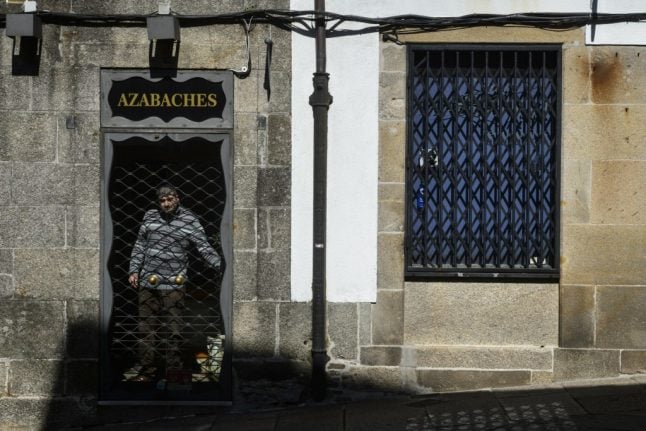We are well into our second week of lock down here in Panton. We have laid in a sensible amount of spare food and necessities – nothing excessive, and are well prepared should the emergency continue.
The village is quieter but functioning, and looking after its own. The overworked local social worker, our friend Maria, is coordinating additional home services for the elderly and disabled in addition to her normal work-load, and the two farmacias are dispensing as usual.
Mini-markets and bakeries are working hard, because a trip into Monforte de Lemos, to the supermarkets, is now a bit of an ordeal.
There is an air of sadness mingling like an uninvited guest at a party, slinking around amongst the sunshine and spring bird choirs.
READ MORE:
- LATEST: Coronavirus death toll in Spain climbs above 4,000
- Brutal choices, loneliness, death: This is life on the frontline for Spain's medics
All of our village cafes are closed, so there is no buzz of conversation in the streets and squares, no kids are playing soccer against the wall of the Concello building.
Every village in Spain has its own, obligatory, teenager on a moped, who seems to spend his day buzzing up and down one street. Ours has been grounded for the duration. I miss him. He has narrowly missed me a few times too.
Here in Casa Girasol, we no longer form a duo, we are a trio. A sextet if you count Minnie, Raphael and Mario.
Our Workaway volunteer arrived two weeks earlier than arranged. He was supposed to house-sit at the end of this month, while we attended a wedding in the UK, which has been postponed.
We are, at this stage, unsure when he will be able to leave – having nowhere definite to go, and Workaway placements being suspended. I hope he likes us! He is enjoying my cooking, anyway, and has performed a couple of miracles in the garden.
When he’s not renovating a shed, and digging, he has his own space, so we are not overcrowded. I can only guess how people who live in small apartments must be managing.
My partner works online, so it’s business as usual for her, and she’s in the study all day every day. I am busy with my own projects, as well as feeding everyone – freezer diving in case we have power outages – and being creative with leftovers so we don’t waste a single thing.
I am missing our regular Friday lunch group. It’s a jolly mix of Spanish and emigres, and we visit a different venue each week. We get to practise our atrocious Spanish when we get silly on post-prandial chupitas.
Everyone is still enjoying over-the-fence chats with neighbours. It will take more than a pandemic to stop the Spanish talking! And It’s not all news of the virus: we are discussing spring planting, the weather (as always), and our health. Few changes there!
Masses at the village church and at the convent have stopped – something I never thought would happen.
Easter celebrations will be in the home. None of the usual horde of Madrileños will be descending during Semana Santa. But the bells are still ringing out each day. I have come to pace my day by the convent bells.
People I know are networking online with their social circles, as well as family and friends abroad.
They tell me they are watching lots of tv and movies, reading, gardening (if they have a garden) and crafting. Many are getting on with small maintenance jobs around the homestead, if they can get the necessary materials.
I am setting aside thirty minutes each day to enjoy guided meditations, a practise I allowed to slip during the mayhem of home renovations. I am also reading some of my favourite books again.
Many friends have lost their income, and have little or no savings to cushion them. They are less preoccupied than I with using their additional free time creatively, and are more concerned with how they will manage.
Nobody I know is “panic-buying”, and all are offering to help each other and share. We and two of our lovely neighbours are feeding and sheltering dogs who were left behind when their family de-camped to stay with relatives in another village.
I have started to keep a “plague diary”. I am noting all of the little things that I observe day-to-day, now that life has shortened pace. As a writer, perhaps my role is also to see and record?
To see a pair of crows fighting off buzzards from their nest; because I have time to sit in the garden and stare at the sky. To see the emotions and expressions in the eyes of the villagers of Panton more vividly, because their mouths and noses are masked. To record what I see, so that this extraordinary time, and the extraordinary actions, of very ordinary people, will be remembered.
READ MORE:



 Please whitelist us to continue reading.
Please whitelist us to continue reading.
Member comments